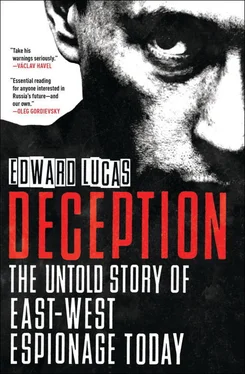The spotlight also endangers all a case officer’s previous contacts and operations. Marc Doe, a British official based at the embassy in Moscow who was exposed in the Russian media after a bungled operation, turned out to have a diplomatic cover job that involved channelling embassy funds to human-rights organisations long denounced as fronts for Western interests by the Russian authorities. 7That was an excruciating blunder. For these hard-pressed and vulnerable outfits, the furore weakened their defence.
But the greatest risk remains recruiting the wrong person. Sign up the wrong source and you will give away far more than you gain. Hire someone with a fragile ego and a short temper and you risk a major security breach. The case of Richard Tomlinson, a renegade British spy who published a book in Russia about his recruitment, training and quarrels with his bosses, has been costly and damaging for Britain’s intelligence agencies and their foreign partner services. 8
In past decades the most formidable spies on both sides were ‘illegals’ – sent on long-term clandestine assignments, using stolen or fake identities, and without the benefit of diplomatic cover. One of them was Sir Paul Dukes, described in chapter 8, whose work under the noses of the Bolsheviks in the years following the Russian revolution makes him probably the most brilliant spy in the history of MI6. But after the debacles of the 1940s (of which more later) Western countries stopped trying to send agents to live undercover behind the Iron Curtain: the difficulty of creating sufficiently credible false identities for people to function inside a closed totalitarian society was just too great. The KGB and other services, however, made great efforts to send their agents to the West, sometimes for lifetime assignments. Some of the agents unearthed in June 2010 were just this kind of classic ‘illegal’. Such spies are formidably expensive. By Russian estimates, creating an illegal identity costs around $1m per head. Still, even if they do nothing for decades, they may, in the right place at the right time, justify their mission. An extreme case is for a military-intelligence agency wishing to acquire a special-operations capability in the event of war. Simply establishing the illegals deep behind enemy lines will be well worth it when it comes to the outbreak of war (‘Day X’ in Soviet parlance) when invisible sabotage capability is priceless. In peacetime they can be vitally useful too, even when they do little or no actual spying themselves.
To understand why, imagine that you are a Russian intelligence officer working under diplomatic cover, tasked with gaining information about the British Parliament, or America’s Congress. You have hundreds of potential targets: lawmakers, their staffers, even cleaners and technicians. But you are an obvious subject for surveillance. Your every meeting and every move carry a risk. You simply cannot afford to hang around in the bars of Westminster or Capitol Hill, chatting people up. Eventually even the most over-worked or demoralised counter-intelligence officers will notice you. So you need eyes and ears in the circles you wish to infiltrate, someone to spot people with access to the information you need, to identify their weaknesses (financial, sexual, psychological or political) and to cultivate them. A journalist, lobbyist or think-tank researcher would be ideal. You cannot play that role, but an illegal can.
If a potential source has strong convictions, an illegal can help turn loyalty to treachery with a ‘false flag’ operation. A standard KGB task in the past, for example, was to find out how East European émigrés were supporting dissident movements in the homeland. A good approach was to pose as an ardent anti-communist, representing a bunch of wealthy donors (preferably based in a faraway country) wanting to target their support effectively. Such a person, eager to gain ‘analysis’ of the real situation, could credibly pay expenses and stipends to those who kept him informed. This still works today. If you are targeting left-wingers, pretend to be from Cuba; if you want to recruit Muslims, a claimed link with the Palestinian cause will do the trick. If the target is Jewish, or a conservative Christian sympathetic to Israel, say that you are working for Mossad. For an embassy-based intelligence officer to assume such an identity is complicated and risky. An illegal can adopt it more convincingly. For the target, checking the authenticity of such an approach is tricky to impossible: how can, say, a Polish expatriate working in an energy company know if the friendly compatriot enquiring about the workings of the gas market is really an undercover officer of his country’s Agencja Wywiadu (foreign intelligence service) as he claims? He may be a Russian illegal, or working for the Saudis or Chinese. How to check?
Illegals can also help funnel funds from the buyer to the seller of secrets. But they cannot help with, and indeed are part of, a bigger problem: getting value for the money paid. A hint of this comes from the published fragments of intercepted communications between ‘Moscow centre’ – the headquarters of Russian espionage – and two of its illegals in America. The bosses are tut-tutting about the house lived in by ‘Cynthia and Richard Murphy’: does it belong to them (which would fit their cover story)? Or is it really the property of the Russian state? It is easy for each end to feel cheated by the other: the illegals regard everything they spend as a claimable expense. They are in effect doing two jobs: their cover profession and real spying. It is quite fair that the motherland should subsidise their property, cars or children’s education. For their part, spymasters worry that operational funds are dribbling away into peripheral expenses, padding further a lifestyle that for most Russians would already seem unimaginably pampered and pleasant.
Illegals are also useful in the humblest parts of spying. Joe Navarro, a twenty-five-year veteran of FBI counter-intelligence, points out that one of their functions is simply to acquire legal documents such as a passport, driver’s licence, university ID card or utility bills that can then be used as the basis for future forgeries. He describes illegals as like cancer: they have usually done their worst by the time they are detected. No electronic intercept or embassy-based spy can gain access to things that an illegal living as an average American can manage:
a car, a home, a library, neighbourhood events, air shows on military bases, location of fibre cables, access to gasoline storage facilities, a basement to hide an accomplice, a neighbour’s son serving in the military, and so on. A mere walk… can give you access to vehicles parked at a garage sale that have stickers from government installations or high tech companies doing research. These individuals can be tracked or befriended… [Illegals] get invited to parties, meet people and gain access to individuals with knowledge, influence or information. 9
For a service with the money and patience to run them, illegals clearly have many uses. They present one of the trickiest problems in the counter-intelligence universe. Whatever they do or don’t do, they are certainly no laughing matter. The real question is whether they justify their costs. From a Western perspective now, the answer is ‘usually not’. It makes more sense to use lots of disposable junior intelligence officers working under light cover than to concentrate resources on a small number of costly assets with elaborate cover stories. The classic work on this is a declassified CIA study called Principles of Deep Cover by a long-dead intelligence officer who used the pseudonym C.D. Edbrook. 10He writes:
Because the deep-cover agent must usually devote a large share of his time to carrying on his ostensible legitimate occupation, his intelligence production is quantitatively small. He is therefore an expensive agent, justified only by the uniqueness of information he produces, or can be expected in the long term to produce. The establishment of a deep-cover operation should consequently derive without exception from the object to be achieved, not from the availability of the agent or the opportunity for cover.
Читать дальше












